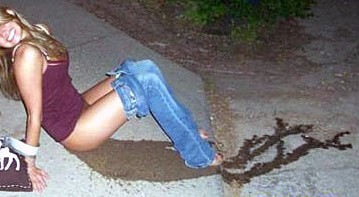
Public-service advertisements aimed at reducing binge drinking may be increasing binge drinking.
That is the conclusion of a Northwestern University study, as reported in Advertising Age.
It faults the ads' reliance on
“self-conscious” emotions such as guilt and shame to make their point.
Guess that means the pee girl photo above won't work either.
]
Northwestern's Kellogg School of Management conducted the five-part study–to be published in the Journal of Marketing Research later this year–that was based on interviews with 1,200 undergraduate
students shown ads created for the research that were modeled after
anti-alcohol ads that ran in Canada.
While guilt and shame have been long thought to be the ideal way of warning against binge drinking (or any other harmful human behavior, really), the study found the opposite is true. Viewers, who already feel some level of guilt or shame,
instinctively tune out the messages and, in some cases, are more likely to engage in the behavior they are being
warned about.
Kellogg marketing professor Nidhi Agrawal, who conducted the study along with her Indiana University
colleague Adam Duhacheck, called what is going on in the viewer's head “defensive processing.” She added that it does not have to be drinking that the viewer is feeling feeling
ashamed about to render the ads ineffective or damaging.
“If
you're talking to a student about cheating on an exam, and one of these
ads comes up,” Agrawal tells Ad Age, “you can bet they are headed straight to the bar.”

OC Weekly Editor-in-Chief Matt Coker has been engaging, enraging and entertaining readers of newspapers, magazines and websites for decades. He spent the first 13 years of his career in journalism at daily newspapers before “graduating” to OC Weekly in 1995 as the alternative newsweekly’s first calendar editor.

